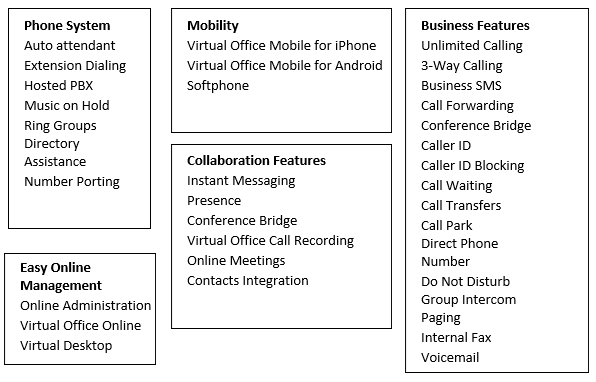No matter if you are a small business or a large scaled organization: you have some sort of audible communications system in place. The means of communication can range from regular phone wired lines to VOIP.
At this point you may ask yourself what is the system your business has, or what is the difference between a phone and VOIP system?
The simple answer is that phone land lines are wired end to end communication with limited service functions, whereas VOIP (Voice Over Internet Protocol) has a variety of additional options to apply towards your business.
Here are some major differences between the two platforms:
VOIP Regular Phone Line
Setup Low cost High cost
Maintenance & Running Low cost High cost
Technology Support Voice, video + any internet format Voice only
Scalability Easy to add at low cost additional equipment (high cost)
Add-ons New feature and no cost limited features and high cost
Call Pricing Free VOIP-VOIP. Other calls low flat fee All calls charged
What are the main features VOIP offers?
VOIP service is based on IP (Internet Protocol) which means that when you use VOIP you basically can utilize most services the internet offers. Let’s explore those features:
Call forwarding
Call recording
Remote use
Call analytics
Voicemail to email messages
Voicemail to text messages
Controlled anonymous and spam block
Any device compatibility (phone, tablet, PC and more)
Third party systems integration with most software and tools which already exist in your systems
Scalability doesn’t require new devices or lines, easy and at a low cost
There is no question that VOIP has more features to offer than a regular landline phone. The listed above features are only part of the full features options of VOIP services. At times it may be confusing to know which services and features your business needs and a best practice is to consult a VOIP Service Provider in order to avoid mistakes and to maximize the potential of the service for your business. The consultation is usually free and requires providing minimal information on your side to assess the scope of service and the best implementation process.
Is VOIP cheaper than regular phone lines? What are the costs of VOIP?
Landline service
As a general rule of thumb, landline phones require an installation fee which is usually around $100 in order to be able to provide the line service. On top of the initial fee, there is a usage fee which goes for around $100 per line. This means that in the event that you have 20 lines operating in your business, you would have to pay around $2,100 in order to keep your business connected and operating. Most additional features would cost you additional fees to set up and operate.
VOIP Service
When it comes to VOIP costs, savings are usually up to 80%. In addition, you get a full range of capabilities and features at no additional cost. This means you have more budgets to dedicate to scaling your communication and business operations.
Is VOIP service better than standard tools available on the market?
Recently, there are more and more tools coming into the market allowing communication over the internet. There are many examples; the main would probably be Zoom and Microsoft Teams. Those tools are marketed as a valid communication service, however they don’t always fit all kinds of businesses and usually offer far less options than VOIP Services for business. VOIP services come with an abundance of features supported by a dedicated provider and a full service package and support in case anything goes wrong.
What extended features are usually included in VOIP services?

How do I get VOIP services?
In order to get started with VOIP services, you need to have an internet connection. As most businesses have the internet in place, your VOIP provider will have to make sure your internet connection is the right one for your needs in order to ensure your VOIP system will operate smoothly and won’t overload your network. After that is taken care of, your provider will work with you on the selection of the best fit equipment for your business needs and abilities. This is an important stage, as you don’t always know what is best, but you definitely know what you need. The provider usually has experience with different types of systems and businesses and will be able to suggest best practice solutions for your needs and the nature of your business. After your devices are setup and your VOIP numbers configured, you can begin using the VOIP services on any of your connected devices.
Is VOIP better than a regular phone?
As you can see, VOIP has a larger variety of features, lower costs and operational benefits. Some businesses can do away with traditional phones, however under the current reality of remote work or even the growing scope of networking, meetings and staying in contact with clients and workers, the transition to VOIP services is a natural solution. If the implementation of the VOIP systems is done by a professional provider, you should expect great results and increased efficiency to your business operations.
How do I find a VOIP service provider?
There are many VOIP providers in the market, but from our experience what makes the difference is the experience and the accessibility of your provider. Experienced providers will know best how to translate your needs to the right VOIP system and choosing a local and trustable provider will assure you get best service in those moments you need it urgently.
